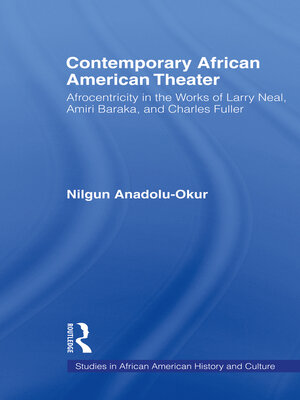Contemporary African American Theater
ebook ∣ Afrocentricity in the Works of Larry Neal, Amiri Baraka, and Charles Fuller · Studies in African American History and Culture
By Nilgun Anadolu-Okur

Sign up to save your library
With an OverDrive account, you can save your favorite libraries for at-a-glance information about availability. Find out more about OverDrive accounts.
Find this title in Libby, the library reading app by OverDrive.



Search for a digital library with this title
Title found at these libraries:
| Library Name | Distance |
|---|---|
| Loading... |
The Black Arts Movement was sparked by the Civil Rights movement and the urge to produce and revitalize functional, realistic, and holistic symbols to express African American creativity. When Larry Neal began his quest for a new dramatic form to epitomize African American self-determination he laid the foundation upon which his friends and compatriots-Amiri Baraka and Charles Fuller-would build. Expressing their individual protests through their writings, these artists soon united in their attack against Eurocentrism, which traditionally minimized or neglected the roles played by Africans and African Americans on the world stage. Their writings signaled a radical change in the form and content of African American writing, particularly drama.
In this insightful examination of African American cultural history, the author explores the heart of the dramatic imagination of African Americans during the turbulent years of the Civil Rights and Black Power movements. The analysis of the works of these three important dramatists reveals the roots of an Afrocentric approach to the theater, and introduces a new methodology for exploring Afrocentrism that is particularly suited to classes in African American drama and literature.ࠁ
In this insightful examination of African American cultural history, the author explores the heart of the dramatic imagination of African Americans during the turbulent years of the Civil Rights and Black Power movements. The analysis of the works of these three important dramatists reveals the roots of an Afrocentric approach to the theater, and introduces a new methodology for exploring Afrocentrism that is particularly suited to classes in African American drama and literature.ࠁ







